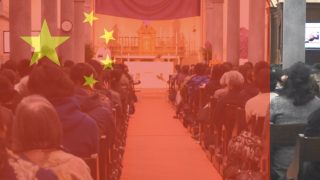The most comprehensive official document ever published on religious persecution in China quotes Bitter Winter 74 times.
by Massimo Introvigne

Sobering but enlightening reading
In China, religious believers, including those of registered and government-controlled five authorized religions, are routinely “tortured, physically abused, sexually abused, arbitrarily arrested, detained, and tried and sentenced without legal safeguards.” These words come from a statement signed by the United States and other countries at the 2019 Ministerial to Advance Religious Freedom, but may serve as a summary of the section on China of the 2019 International Religious Freedom Report, published on June 10, 2020 by the U.S Department of State.
The Department has produced the best and most comprehensive official document to date on religious liberty, or more exactly on religious oppression, in China. Nothing is missing in the 115-page document, which has separate sections on Hong Kong, Macau, Tibet, and Xinjiang. The authors surveyed a great number of sources, including scholarly articles, reports by NGOs, and media. In last year’s report, Bitter Winter was the most quoted source, with 15 quotes. This is also true for this year’s document, with the number of quotes from Bitter Winter raising to 74. The report notes that Bitter Winter’s reliable coverage of religious persecution in China comes at a price. “At least 45 of its [Bitter Winter’s] correspondents and contributors in the country were detained, and some physically abused, as a result of the government’s retaliation against reporting on religious freedom.”
We recommend that our readers access the whole document, which makes for sobering but enlightening reading. Page after page, we are confronted with cases “of deaths in custody and that the government tortured, physically abused, arrested, detained, sentenced to prison, subjected to forced indoctrination in CCP ideology, or harassed adherents of both registered and unregistered religious groups for activities related to their religious beliefs and practices.”
“There were, the document states, reports of deaths in custody and forced disappearances, and organ harvesting in prison of individuals whom, according to sources, authorities targeted based on their religious beliefs or affiliation. There were reports that authorities tortured detainees, including by depriving them of food, water, and sleep.”
Money offered to informers
Although the CCP is guilty of worse crimes, one of its most despicable practices is offering “financial incentives to law enforcement to arrest religious practitioners and to citizens who reported ‘illegal religious activity.’” For example, according to the report, “Guangzhou officials from the Religious Affairs Bureau in March announced a new policy offering financial rewards to people who reported ‘illegal religious activities,’ in an ongoing crackdown on underground gatherings. The new policy would also allow members of the public to earn up to RMB 10,000 ($1,400) for providing information leading to the arrest of a non-Chinese religious leader. Other payment incentives included RMB 3,000 to 5,000 ($430-$720) for tips about locally organized gatherings and their leaders.”
Some examples of “illegal religious activities” included “building unauthorized temples and monasteries, organizing unauthorized pilgrimages, worshipping at unauthorized churches, and printing unauthorized religious publications.”
These measures led to the arrests of prominent house church leaders, Jehovah’s Witnesses, Catholic conscientious objectors refusing to join the Chinese Patriotic Catholic Association, those worshiping at non-authorized Buddhist and Daoist temples, and even members of the five authorized religions. The report notes that, in the Xi Jinping era, each year makes religious persecution worse, and the 2017 New Regulation on Religious Affairs is now used as an important tool to repress believers of all faith.
The Church of Almighty God
The most persecuted groups in China are those defined as “cult organizations” (xie jiao, whose more accurate translation would be “heterodox teachings.” “Criminal law, the report reminds its readers, defines banned groups as ‘cult organizations’ and provides for criminal prosecution of individuals belonging to such groups and punishment of up to life in prison. There are no published criteria for determining, or procedures for challenging, such a designation. A national security law also explicitly bans ‘cult organizations.’”
There are several pages on the persecution of The Church of Almighty God (CAG), the most targeted Christian movement in China. In Shandong Province only, authorities “arrested more than 6,000 members during the year as part of a nationwide crackdown.” Figures released by the CAG are quoted, mentioning that in 2019 “at least 32,815 Church members were directly persecuted by authorities, compared with 23,567 in 2018. The [CAG yearly] report [on persecution] stated that authorities harassed at least 26,683 church members (at least 12,456 in 2018), arrested 6,132 (11,111 in 2018), detained 4,161 (6,757 in 2018), tortured 3,824 (685 in 2018), sentenced 1,355 (392 in 2018), and seized at least RMB 390 million ($56 million) in Church and personal assets. At least 19 Church members died as a result of abuse (20 in 2018). These 19 included two who died as a result of undergoing physical abuse and forced labor, three who committed suicide as a result of authorities surveilling and pressuring them to renounce their faith, and 11 who died of medical complications during or following their detention.” “Some detainees reported they were put in a ‘tiger chair,’ a device used to create stress positions during interrogations, and others said authorities denied them medical treatment and prevented them from sleeping.”
Some examples are discussed in detail. In January, CAG member “Ren Cuifang of the Inner Mongolia Autonomous Region died 12 days after being arrested. The report stated that on her remains there was bruising around her eyes and the left side of her chest. There was a burn scar on her thigh and lacerations with blood marks on her wrists and heels.” “On May 30, police arrested a couple in Xinmi City, Henan Province. During questioning, police struck the husband repeatedly across the face, kicked him in the lower back, clubbed his toes with an iron bar, and forced him to take off his clothes and kneel on an iron rod. He suffered two broken ribs on his left side. They stomped on the wife’s toes and instep, struck her in the face with a ruler, and handcuffed her behind her back with one arm twisted up over her shoulder and one arm twisted from below.” “In July Cheng Dongzhu of Hubei Province, under the pressure of constant surveillance by authorities, drowned herself in a lake.” “In May police attempted to arrest Li Sulian, a member of The Church of Almighty God, in her apartment, but before they entered she died from a fall in an attempt to escape out the window using a bed sheet.”
Falun Gong
Severe persecution of Falun Gong also continued. The report mentions that, according to the movement’s own figures, “police arrested 6,109 and harassed 3,582 Falun Gong practitioners during the year [2019] for refusing to renounce their faith. At year’s end, 3,400 practitioners remained in custody.” The CCP was also responsible “for the deaths of 96 individuals [Falun Gong members] on account of their beliefs or affiliations, 19 of them while being held in prisons, police stations, or detention.”
Some specific cases are mentioned. “In the early morning on January 11, Guo Zhenxiang (aged 82) of Zhaoyuan City, Shandong Province, was arrested for passing out leaflets at a bus station. At approximately 10 AM authorities informed her family that she had died after becoming ill at the station and being taken to a local hospital.” “Yang Shengjun of Jiamusi City, Heilongjiang Province, was arrested on August 2 and died on August 11. Authorities told Yang’s family that he had vomited blood at the detention center early that morning and been sent to Jiamusi Central Hospital for emergency treatment. According to the family, they were charged RMB 30,000 ($4,300) for Yang’s medical treatment.” “On December 7, Li Yanjie of Heilongjiang Province fell to her death while trying to escape out the window of her 6th floor apartment as police attempted to force open the front door.”
Although in 2019 Hong Kong still maintained a level of religious liberty unknown in China, Falun Gong practitioners were harassed there by CCP-hired thugs. “In September two assailants attacked a Falun Gong practitioner after she met with police to discuss a planned Falun Gong demonstration. In November, a printing warehouse for the Epoch Times Hong Kong Edition, a Falun Gong-associated media outlet, was subject to an arson attack by four masked assailants armed with batons.”
Falun Gong practitioners continue to be the main, although not the only, target of the barbarian practice of organ harvesting. The report notes that it becomes increasingly difficult for the CCP and its fellow travelers to deny that organ harvesting is a reality in China. “During the year, two international academic studies examined the country’s transplant system. These studies revealed new information about reports of the government’s practice of forcibly extracting organs from prisoners, including religious adherents.” The conclusions of the independent China Tribunal are also mentioned.
Uyghurs and Tibetans
The section on Tibet of the report offers a detailed assessment of the worsening condition of religious freedom for local Buddhists. It also mentions the CCP’s paradoxical but dangerous attempts to control the reincarnation of the main lamas, presumably extending to the search for the future Dalai Lama when the present one will die.
Particularly disturbing are reports of “instances in which authorities subjected nuns who had been forcibly removed from Yachen Gar Tibetan Buddhist Institute to sexual assault and sexual violence.” In a county detention center in Nagchu Prefecture, TAR, “officers fondled the breasts of nuns who had fainted during military training and lay in the nuns’ cells ‘pressing unconscious nuns underneath.’”
In Xinjiang, the persecution of Uyghurs and other Turkic Muslim reached new heights. The report dismisses the CCP’s claim that the transformation through education camps are just “vocational schools.” They are, the report says, jails where inmates are indoctrinated, subject to forced labor, tortured, and in some instances killed. Curiously, the CCP media themselves claim that “religious extremists” are “brainwashed” there. The report quotes “the Xinjiang government and educational websites as stating, ‘Vocational Skills Training Centers wash clean the brains of people who became bewitched by the extreme religious ideologies.’”
It does not take much, the report explains, to be arrested and taken to the dreaded camps. As one Uyghur living in the U.S. explained, “In the kindergarten, they would ask little children, ‘Do your parents read the Quran?’ My daughter had a classmate who said, ‘My mom teaches me the Quran.’ The next day, they are gone.”
In fact, Xinjiang as a whole is being transformed into a jail. “The government, the document reports, continued to require all individuals in Xinjiang to have a spyware app on their mobile phone because the government considered ‘web cleansing’ necessary to prevent access to ‘terrorist’ information. Failing to install the app, which could identify whom people called, track online activity, and record social media use, was deemed a punishable offense.” And new “Wi-Fi sniffers in public places monitored all networked devices in range.”
Sexual abuse is part of the repression in Xinjiang, as it is in Tibet. “More than one million CCP officials from other parts of the country live part-time with local families in Xinjiang.” It is called the “Pair Up and Become a Family” program. One CCP officer interviewed about the program explained that it is “normal for [Uyghur] females to sleep on the same platform with their paired male [CCP] ‘relatives.’.” There are also reports that “officials forced Uighur women to marry Han men under threat of arrest or imprisonment of the women and their families.”
Chinese CCP officers who stayed in Uighur households as part of the “Pair Up and Become a Family” program also “brought alcohol and meat, including pork, into the home and expected those they stayed with to consume them, in violation of halal principles. According to the village secretary, ‘We are not so insane as to tell them that we are Muslim, so we cannot eat the things they eat’” —that would immediately buy to the Uyghurs a ticket to the transformation through education camps.
The long arm of the Dragon
Not content with persecuting believers in China only, the CCP also harasses religious refugees abroad. Leaked documents about the persecution of the Uyghurs “included explicit directives to track Xinjiang Uyghurs living abroad. China’s embassies and consulates took part in these efforts. The documents described the government’s policy of urging foreign governments to repatriate Uyghurs,” who should then “‘be placed into concentrated education and training’ immediately upon their return to China.”
The yearly U.S. Department of State International Religious Freedom Report has sections on most countries of the world. When discussing South Korea, the report mentions how the long arm of the CCP dragon extends there too. For example, “Falun Gong-affiliated performance troupe Shen Yun was unsuccessful in reserving public venues in January, February, and July in Seoul for commercial performances, including at the government-affiliated Seoul Arts Center and the Seoul city government-affiliated Sejong Center for the Performing Arts.” The same happened in Busan. Various pretexts were quoted, but in fact it is likely that “the venues and their associated government authorities refused these requests to avoid conflict with the Chinese government.” “Local sources inside and outside the [South Korean] government noted the country’s cautious approach toward the Chinese government, especially on sensitive ‘internal’ issues like Falun Gong, and said the government’s caution was reinforced in part by the experience of China’s economic retaliation against the government for allowing the deployment of a U.S. Terminal High Altitude Area Defense (THAAD) system in 2017, the economic effects of which, the sources said, were still being felt.”
Source: Bitter Winter


